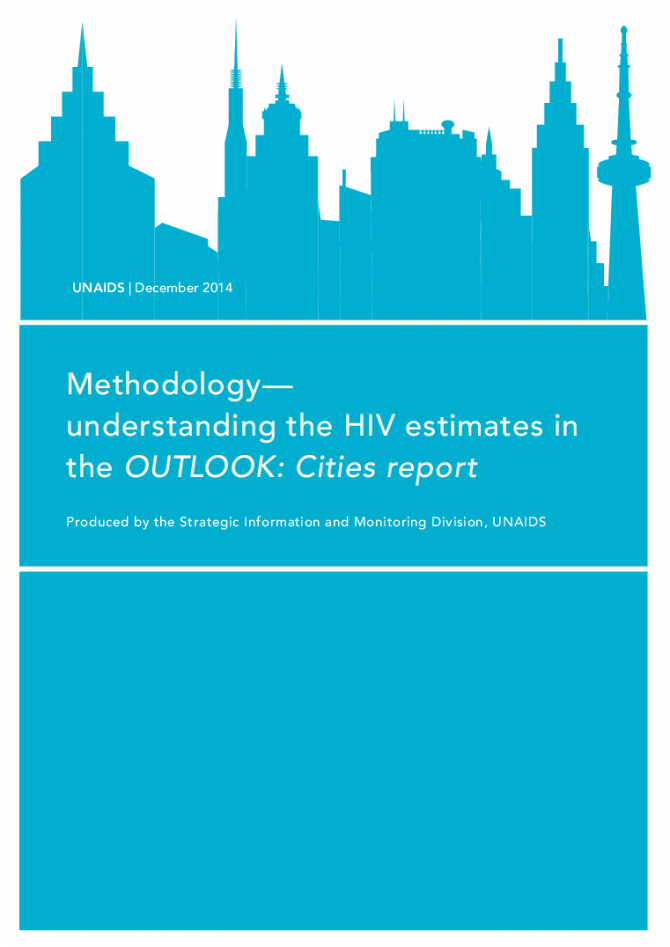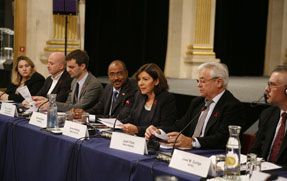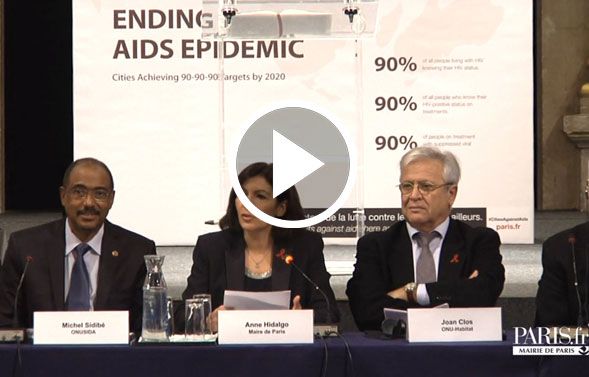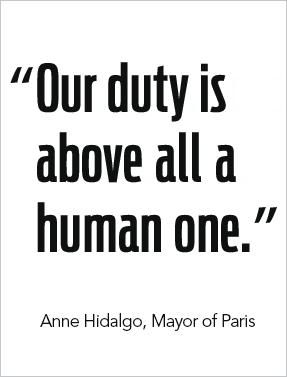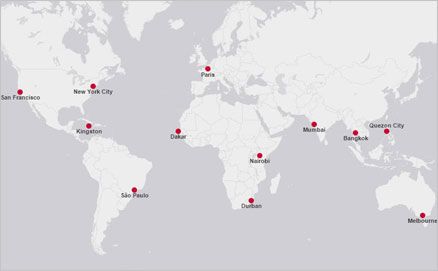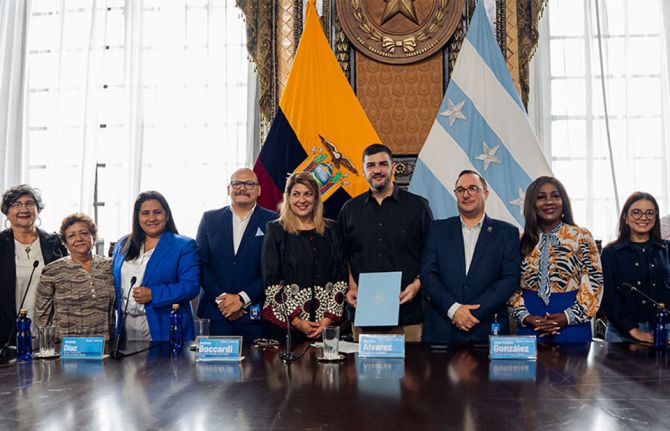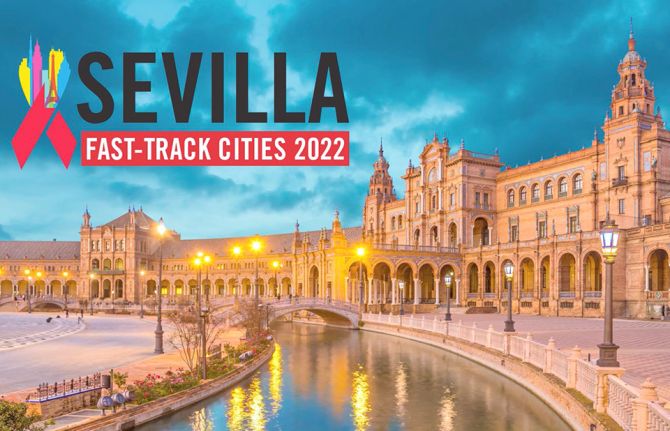Documents
Methodology— understanding the HIV estimates in the OUTLOOK: Cities report
27 November 2014
UNAIDS’ 2013 modelled estimates that the HIV prevalence in the urban areas of countries in sub-Saharan Africa is twice the national HIV prevalence elsewhere in the countries were multiplied by the population sizes of cities to identify a preliminary list of 300 cities in which the largest number of people living with HIV were likely to reside. For each of the 300 top-ranked cities, a comprehensive review of all available data sources was conducted to refine the modelled estimates and to produce a final estimate of the total number of people living with HIV in each city for the top-ranked 200 cities.



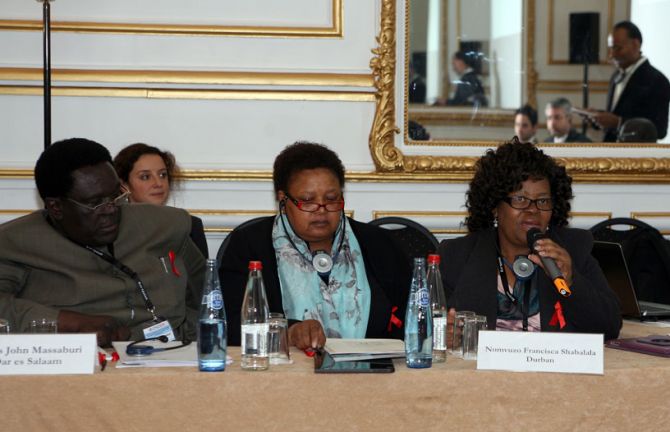
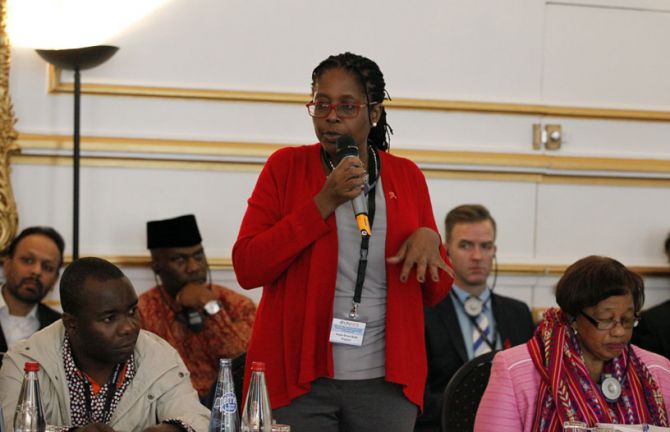


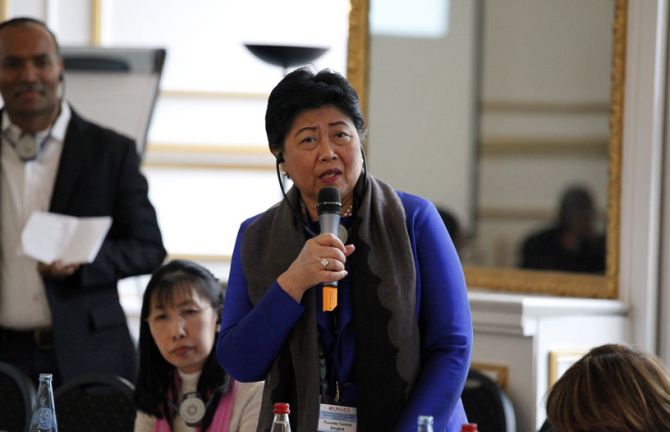
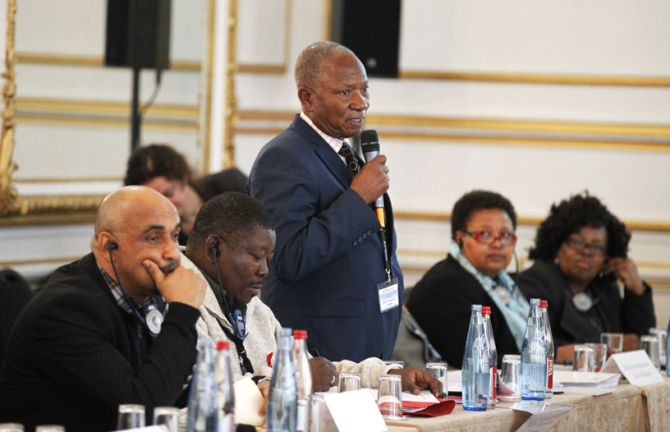
Update
Innovative new initiative to end the AIDS epidemic in cities
30 November 2014
30 November 2014 30 November 2014On the eve of World AIDS Day 2014, mayors, city representatives and people living with HIV came together in Paris to prepare plans to implement an innovative new initiative to end the AIDS epidemic in cities.
The Fast-Track Cities initiative includes commitments to achieving the UNAIDS 90–90–90 targets by 2020, which will result in 90% of people living with HIV knowing their HIV status, 90% of people who know their HIV-positive status on antiretroviral treatment and 90% of people on treatment with suppressed viral loads, keeping them healthy and reducing the risk of HIV transmission.
It will encourage new, cutting-edge service delivery programmes that will not only advance the response to HIV but will also pave the way for cities to address other major public health challenges such as tuberculosis and noncommunicable diseases. Participants were encouraged to share best practices in their cities so that other cities can benefit from their experiences.
They discussed how city leaders could rally resources, talents and innovation in order to ensure people are at the centre. They also highlighted the importance of accelerating access to HIV testing and treatment services, eliminating stigma and discrimination and significantly reducing new HIV infections. They stressed that a better understanding of HIV epidemics in cities would empower leaders to actively address the gaps in the response and reach the people being left behind.
The meeting was convened by the City of Paris, UNAIDS, UN-Habitat and the International Association of Providers of AIDS Care.
The Fast-Track Cities initiative, to be launched on World AIDS Day 2014, will be led by mayors, in partnership with communities, civil society, public health officials, clinicians, law enforcement agencies and others. It is expected to deliver significant results in improvements in the health of people living in urban areas.
Quotes
"We are here not just to advocate for progress but to set a clear path for implementation in all of our cities to ensure that our ambitious objectives are turned into action."
"Durban aims to be Africa’s best, most liveable and caring city. And we know that a strong, equitable and effective AIDS response is critical to this vision."
"We are here to create a sustainable and dynamic network of partners to share best practices and to learn from another, so that at the end of the day, together, we can we can achieve our goals."
"By engaging the key populations who are most affected by HIV—including sex workers, men who have sex with men, and people who inject drugs—by focusing on what we know works, and driving down the costs of interventions, we can get to the end of AIDS."
"We have the tools, knowledge, and experience to end AIDS. But what will define our progress is how we deal with issues of discrimination, social exclusion and inequity. City leaders know better than anyone in the world the challenges—and solutions—in dealing with discrimination."
“We are listening to and working with communities to strengthen the sense of responsibility among people and ensure services meet people’s needs. Our message is that life is yours, health is yours – and we are here to support you.”

Press Release
Mayors from around the world sign Paris Declaration to end the AIDS epidemic
01 December 2014 01 December 2014On World AIDS Day, mayors meet in Paris as UNAIDS releases a new report on the huge potential of fast-tracking the AIDS response in cities
PARIS/GENEVA, 1 December 2014—On World AIDS Day 2014, mayors from around the world came together in Paris, France, to sign a declaration to end the AIDS epidemic in their cities. In signing the 2014 Paris Declaration, the mayors commit to putting cities on the Fast-Track to ending the AIDS epidemic through a set of commitments. Those commitments include achieving the UNAIDS 90–90–90 targets, which will result in 90% of people living with HIV knowing their HIV status, 90% of people who know their HIV-positive status on antiretroviral treatment and 90% of people on treatment with suppressed viral loads, keeping them healthy and reducing the risk of HIV transmission.
“Ending the AIDS epidemic is achievable if the world’s major cities act immediately and decisively to fast-track their AIDS responses by 2020,” said Michel Sidibé, Executive Director of UNAIDS. “A Fast-Track AIDS response in cities will also encourage new, cutting-edge service delivery programmes that can pave the way for cities to address other public health challenges, including tuberculosis, sexual and reproductive health, maternal and child health, gender-based violence and noncommunicable diseases.”
At the World AIDS Day event in Paris, hosted by the Mayor of Paris, Anne Hidalgo, the mayors joined the Joint United Nations Programme on HIV/AIDS (UNAIDS), the United Nations Human Settlements Programme (UN-Habitat) and the International Association of Providers of AIDS Care (IAPAC) in signing the Paris Declaration. “Cities all over the world are key players that can fast-track the response in order to ultimately end the AIDS epidemic,” said Anne Hidalgo, Mayor of Paris. “Our duty is above all a human one. As elected representatives, our choice is to demonstrate solidarity. In Paris, we are determined to take our responsibilities and to live up to our commitments.”
The meeting is taking place 20 years after the Paris AIDS Summit, at which world leaders and communities agreed to a set of principles for the greater involvement of people living with HIV. Known as the GIPA principles, the historic commitment continues to guide the global AIDS response today.
During the event, UNAIDS released a report on HIV in cities, which outlines the important role that urban areas will play in ending the AIDS epidemic by 2030. The OUTLOOK: cities report shows how cities and urban areas are particularly affected by HIV, with the 200 cities most affected by the epidemic estimated to account for more than a quarter of the 35 million people living with HIV around the world. In many countries, cities are home to more than half of all people living with HIV across the country. In sub-Saharan Africa, 45% of people living with HIV reside in cities.
According to the report, more than half the world’s population lives in cities, with the proportion set to expand to 60% by 2050. The vast majority of megacities, defined as having populations of more than 10 million people, will be in low- and middle-income countries. Fast-tracking HIV responses in cities—without neglecting efforts in rural and other areas—will therefore be crucial to ending the AIDS epidemic.
The 2014 Paris Declaration includes commitments to focus on the communities most affected by HIV, to mobilize resources for the better integration of public health and development, to build and accelerate urban HIV strategies and to use the AIDS response as a catalyst for positive social transformation.
“Cities provide ready, flexible and creative platforms that can contribute to ending the AIDS epidemic in a pragmatic, balanced and efficient way,” said Joan Clos, Executive Director of UN-Habitat. “Cities can act as the fora where the linkages, trust, respect and inclusiveness that are part of any sustainable solution can be built.”
The Cities report shares the city photography of renowned photographer Richard Silver. It also features testimonies from community activists, health workers and public officials who have been at the forefront of the AIDS response in the world’s cities. Their stories show how the same urban centres that have been most affected by HIV from the beginning of the epidemic are now uniquely positioned to end the AIDS epidemic. It also highlights the importance of ensuring that people who are marginalized and often stigmatized—including sex workers, people who inject drugs and men who have sex with men—have access to HIV prevention and treatment services.
Tackling poverty and inequality will also be essential. Globally, an estimated 1 billion people live in poverty, with access to only a few services. Poverty and inequality are further tested by multiple health challenges, including HIV and related diseases, such as tuberculosis, the leading cause of death among people living with HIV.
“We must seize this moment of unprecedented scientific opportunity to rapidly reduce the number of new HIV infections and end AIDS-related deaths, without ignoring significant barriers to achieving the 90–90–90 targets in cities, including stigma and discrimination,” said José M. Zuniga, President/CEO of IAPAC. “Achieving these targets requires thinking globally and acting locally, leveraging existing city programmes and resources and implementing locally relevant, locally tailored and locally led interventions to address HIV prevention, testing and treatment gaps.”
Ending the AIDS epidemic in the world’s cities will require leaders who can inspire and harness the compassion and generosity of ordinary urban citizens in order to bring about lasting change. It will depend upon energized communities accelerating and sharpening the focus of local AIDS responses and sharing best practices across urban centres.
In addition to the 90–90–90 targets, UNAIDS also calls for reducing the annual number of new adult HIV infections by more than 75%, to 500 000 in 2020, and achieving zero discrimination. UNAIDS estimates that reaching the 90–90–90 Fast-Track Targets will prevent almost 28 million new HIV infections and 21 million deaths by 2030.
Mairie de Paris
Paris, the capital of the French Republic, has been committed to the AIDS response for more than 30 years through its associations, doctors, hospitals and political leaders. Paris also provides € 2 million each year in funding for international assistance for HIV, particularly in sub-Saharan Africa. For more information go to paris.fr/english
UNAIDS
The Joint United Nations Programme on HIV/AIDS (UNAIDS) leads and inspires the world to achieve its shared vision of zero new HIV infections, zero discrimination and zero AIDS-related deaths. UNAIDS unites the efforts of 11 UN organizations—UNHCR, UNICEF, WFP, UNDP, UNFPA, UNODC, UN Women, ILO, UNESCO, WHO and the World Bank—and works closely with global and national partners to maximize results for the AIDS response. Learn more at unaids.org and connect with us on Facebook and Twitter.
UN-Habitat
UN-Habitat is the United Nations agency working on sustainable urban development with the mandate of promoting adequate housing and improved livelihoods by harnessing the opportunities that urbanization offers. For more information visit unhabitat.org
IAPAC
The International Association of Providers of AIDS Care (IAPAC) represents more than 20 000 clinicians and allied health care professionals in over 150 countries. Its mission is to improve the quality of HIV prevention, care, treatment, and support services provided to men, women, and children affected by and living with HIV and comorbid conditions such as tuberculosis and viral hepatitis. Visit www.iapac.org for more information about IAPAC, the Fast-Track Cities Initiative, and/or its other global activities.
Contact
Mairie de Paris | Marie Francolin | + 33 1 42 76 59 29 | marie.francolin@paris.fr
UNAIDS | Sophie Barton-Knott | tel. +41 22 791 1697 | bartonknotts@unaids.org
UN-Habitat | Jeanette Elsworth | +254 20 762 5518 | jeanette.elsworth@unhabitat.org
IAPAC | Lindsay G. Deefholts | +1 416 301 7966 | ldeefholts@hotmail.com
Press centre
Download the printable version (PDF)
Documents
Mayors from around the world sign Paris Declaration to end the AIDS epidemic
On World AIDS Day, mayors met in Paris as UNAIDS released a new report on the huge potential of fast-tracking the AIDS response in cities
Related
Key resources for UNAIDS country offices and joint United Nations teams, CCM, TSM and other consultants
10 October 2023
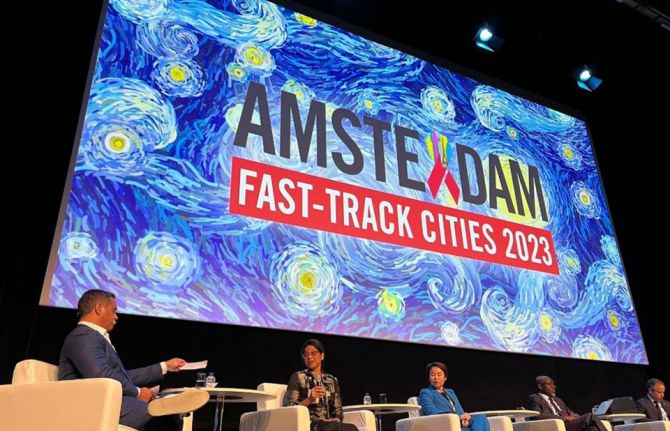 Cities leading the way to achieving key targets in the HIV response
Cities leading the way to achieving key targets in the HIV response

27 September 2023
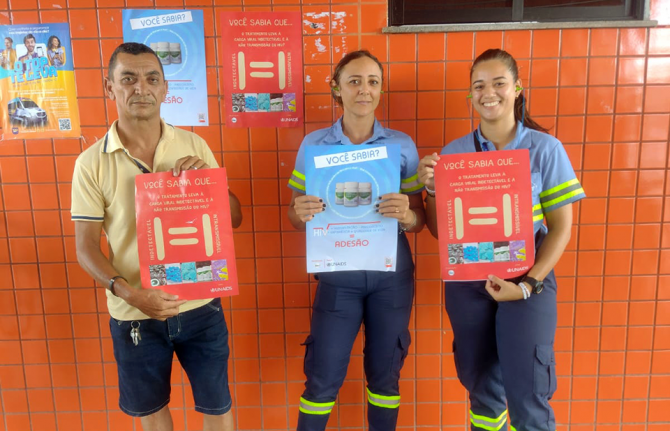 In Northeast Brazil, civil society and local government collaborate to increase HIV treatment adherence
In Northeast Brazil, civil society and local government collaborate to increase HIV treatment adherence

03 April 2023
Ending AIDS, ending inequalities — Fast-Track Cities
11 November 2022
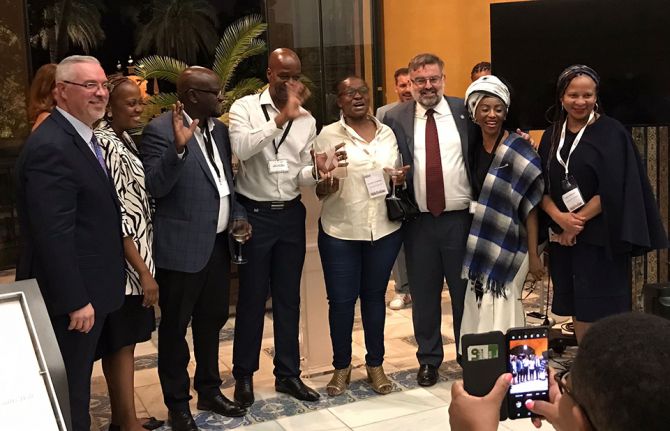 Six cities and a Ukrainian community-led organization recognized at Fast-Track Cities 2022 Conference
Six cities and a Ukrainian community-led organization recognized at Fast-Track Cities 2022 Conference

11 October 2022

Press Release
Global leaders commit to ending the AIDS epidemic in cities by 2030
20 July 2014 20 July 2014MELBOURNE, 20 July 2014—In a meeting initiated by UNAIDS and hosted by the city of Melbourne, Australia, global leaders agreed that cities and local leadership are the key to ending the AIDS epidemic by 2030. The inaugural Cities for Social Transformation meeting took place on the sidelines of the 20th International AIDS Conference. Mayors and representatives of 18 cities, governors, senior members of parliament, health ministers, a Head of State and senior health professionals attended the event.
The leaders committed to a rapid scale-up of prevention, treatment, care and support programmes, as well as addressing the needs of people at higher risk of HIV infection.
“It’s time to focus on local epidemics and city governments will be the driving force for change. They have the resources and the architecture to deliver essential social and health services,” said Michel Sidibé, Executive Director of UNAIDS. “They are the catalyst for forging new partnerships between communities, civil society and government. We will not end the AIDS epidemic without harnessing the power of cities.”
Ratu Epeli Nailatikau, the President of Fiji, Nafsiah Mboi, the Health Minister of Indonesia, Powes Parkop, the Governor of Papua New Guinea’s capital Port Moresby, Dhlomo Sibongiseni, the Health Minister of KwaZulu-Natal Province in South Africa, and Robert Doyle, Lord Mayor of Melbourne, shared their experiences.
"It’s an honour to be hosting this inaugural cities initiative mayors’ meeting. This is an important moment because I believe the world’s cities—our cities—have a pivotal role to play in leading the HIV response … and fulfilling the vision of an HIV-free generation,” said the Lord Mayor of Melbourne.
Current data show that 15 countries account for 75% of global HIV infections, with the majority found in urban centres. It is estimated that 220 cities globally account for over a third of HIV prevalence. In the Asia and the Pacific region, 30 cities account for over a million people living with HIV.
UNAIDS
The Joint United Nations Programme on HIV/AIDS (UNAIDS) leads and inspires the world to achieve its shared vision of zero new HIV infections, zero discrimination and zero AIDS-related deaths. UNAIDS unites the efforts of 11 UN organizations—UNHCR, UNICEF, WFP, UNDP, UNFPA, UNODC, UN Women, ILO, UNESCO, WHO and the World Bank—and works closely with global and national partners to maximize results for the AIDS response. Learn more at unaids.org and connect with us onFacebook and Twitter.
Contact
UNAIDSSaya Oka
tel. +41 79 540 83 07 or +61 4 7507 1409
okas@unaids.org
UNAIDS Bangkok
Artan Jama
tel. +66 94894 9235
jamaa@unaids.org
Photo galleries
Press centre
Download the printable version (PDF)

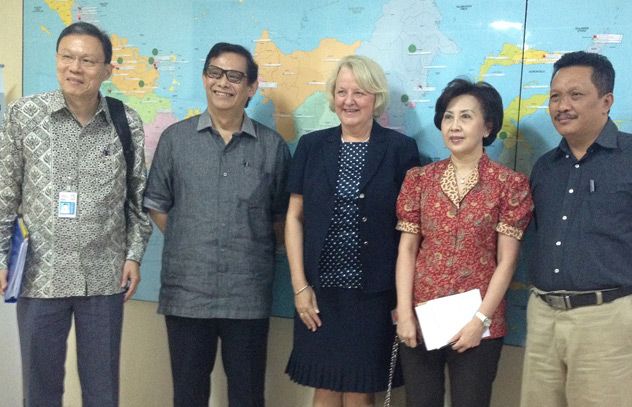
UNAIDS Deputy Executive Director Jan Beagle with the Director of the Indonesian National AIDS Commission, Dr Kamal Siregar at a Jakarta-based “Puskesmas” health clinic that offers HIV and STI testing and counselling and treatment referral in one of the city’s entertainment areas.
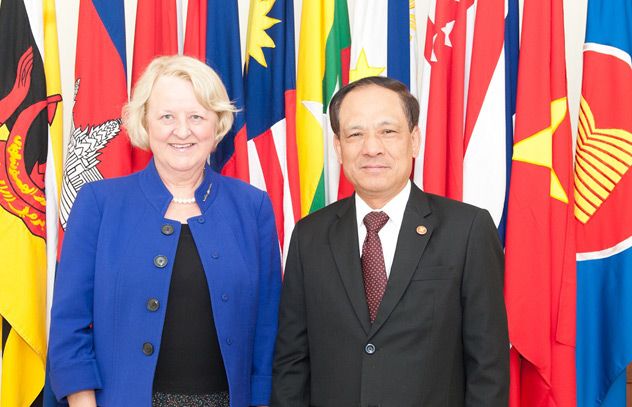
In Jakarta, UNAIDS Deputy Director Jan Beagle met with the Secretary General of the Association of Southeast Asian Nations (ASEAN), Le Luong Minh. Credit: ASEAN Secretariat
Update
Indonesia: City focus key to the HIV response
17 April 2014
17 April 2014 17 April 2014During an official visit of the UNAIDS Deputy Executive Director, Jan Beagle to Indonesia, national and provincial municipal leaders, development agencies and civil society organizations underlined the importance of scaling up and investing in city-based HIV strategies as a critical action towards accelerating progress in the AIDS response.
Speaking with the National AIDS Commission Director Dr Kamal Siregar, Ms Beagle stressed the importance of focusing on city-based HIV responses at a time when the majority of people living with HIV and from key populations at risk reside and/or work in municipal centres. Dr Siregar noted how scaling up programmes and efforts at the city level will enable greater reach to people in need of HIV services, especially among key populations at higher risk.
Jakarta, the capital city of Indonesia is one of the provinces with highest numbers of new HIV infections in Indonesia. The estimated number of people living with HIV in the city as of 2013 is approaching 100 000. According to national surveillance data, estimated HIV prevalence among key populations at higher risk in the city is higher than national averages with 56.4% prevalence found among people who use drugs, 17.2% among men who have sex with men and 10.5% among female sex workers.
Indonesia’s Deputy Minister of Health echoed the need to make cities central to HIV responses noting that city populations often contain large numbers of young people and that youth focus and engagement for HIV is also critical.
Enhanced city-based focus was also welcomed by the Secretary General of the Association of Southeast Asian Nations (ASEAN), which is spearheading the ASEAN ‘Cities getting to Zero’ initiative. Meeting with Ms Beagle, ASEAN Secretary General Le Luong Minh stressed how the ‘Cities getting to Zero initiative’ is focusing on 13 ASEAN cities and municipal areas—which account for large proportions of HIV burden in their countries (including three in Indonesia)—to catalyze country actions towards the achievement of the 2012 ASEAN Declaration on Getting to Zero New HIV Infections, Zero Discrimination, Zero AIDS-related Deaths.
UNAIDS is working to increase the focus on city-based HIV responses. Cities and their importance within the HIV response will also be discussed at the International AIDS Conference to be held in Melbourne, Australia from 20-25 July.
Quotes
"We need to expand comprehensive HIV prevention and treatment in cities to reach the maximum amount of people. We also need to replicate quality and proven city programmes – to from one city to another to help faster and better scale up."
"In our ASEAN ‘Cities getting to Zero’ initiative, the enrolled cities have been very active and enthusiastic. Learning about similarities and differences between the cities on HIV issues is very important. We are documenting the experiences and this will be released later this year."
"From a programme coverage perspective and from an effective investment perspective, increased focus on cities and metropolitan areas can make an important impact. Cities in Indonesia have significant experiences to share that highlight both successes and challenges."

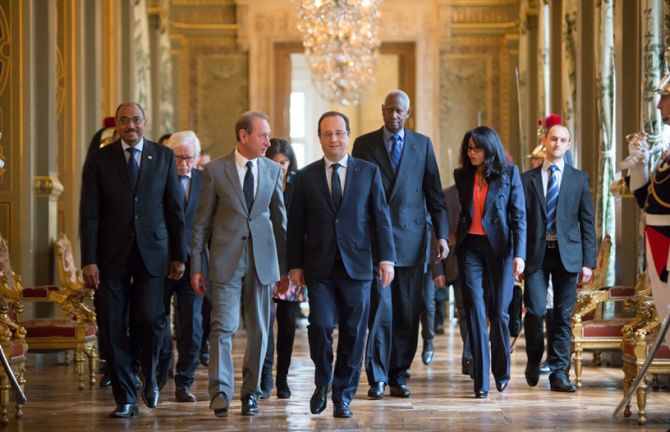
L to R: Michel Sidibé, Executive Director of UNAIDS, Bertrand Delanoe, Mayor of Paris, François Hollande, President of France, and Abdou Diouf, Secretary-General of La Francophonie. Credit: Présidence de la République.
Feature Story
AIDS response is focus of Francophone cities in Paris
18 November 2013
18 November 2013 18 November 2013The Executive Director of UNAIDS delivered a key note address at the Congrès de l'Association Internationale des Maires Francophones (AIMF) at the Hôtel de Ville de Paris on “Shared Responsibility and the AIDS response”. The high-level session was attended by French President François Hollande and President Abdou Diouf, Secretary-General of La Francophonie. The event was hosted by Bertrand Delanoe, Mayor of Paris and President of AIMF and included more than 120 mayors of major cities from La Francophonie.
In his remarks, UNAIDS Executive Director highlighted President Hollande’s leadership on AIDS as an example of his commitment to social justice and cited France’s €1B commitment to the Global Fund to Fight AIDS, Tuberculosis and Malaria’s upcoming replenishment meeting as an example of France’s leadership on AIDS.
President Hollande cited UNAIDS as the example of global mobilization, and reiterated France's commitment.
Mayor Delanoë reiterated the common values of La Francophonie—diversity and the promotion of human rights –demanding that francophone mayors advocate for the right to equal freedom of movement, regardless of one’s HIV status. The meeting concluded with a call to adopt a new resolution for a ‘Francophone world with zero HIV-related stigma and discrimination’.
During his participation at the Congress, the Executive Director of UNAIDS also met with French civil society organizations engaged in the HIV response with the City of Paris. In the majority of Francophone countries, large urban cities account for 20% to 60% of national epidemics.
Since 2001, the City of Paris has devoted €20.5 million to support the HIV response in local communities in Francophone cities, mainly in sub-Saharan Africa. With this funding, Parisian AIDS NGOs work in partnership with the City of Paris to support African civil society programmes for HIV testing, prevention, treatment and social support.
In an interactive dialogue, the community of French NGOs called on UNAIDS to continue to focus on HIV in the cities in La Francophonie, many of which are still lagging behind despite commendable progress in the global AIDS response. They called UNAIDS to lead a new global mobilization in La Francophonie for scaling up of HIV treatment and preventing new HIV infections among children.
Video
Excerpt from the speech of François Hollande, President of France addressing Congrès de l'Association Internationale des Maires Francophones (AIMF) at the Hôtel de Ville de Paris on "Shared Responsibility and the AIDS response".
Quotes
France will maintain its commitment to the AIDS response until the epidemic is over.
I commend the City of Paris for demonstrating its solidarity for the AIDS response. 50 000 people living with HIV have access to treatment every year thanks to your programmes and more than 500 000 people benefit from HIV prevention programmes.
This general assembly of the AIMF should adopt a declaration calling for the freedom of movement of people living with HIV.
For the first time in human history, urban populations now outnumber rural populations. AIMF has taken an innovative approach to address the challenges facing cities today, including water, urban development and finance, education and HIV.
Discours

Feature Story
Namibia’s City of Windhoek collaborates to strengthen HIV response
30 October 2012
30 October 2012 30 October 2012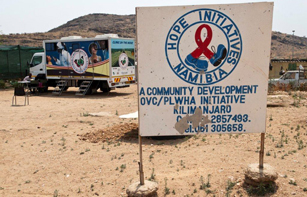
The Mister Sister Mobile clinic parked outside the office of Hope Initiative SA—a community-based organization that provides care and support services for orphans and vulnerable children in the informal settlements around Windhoek.
Credit: UNAIDS/T.Figuera
Similar to many other countries, Namibia’s population has been shifting towards towns and cities in search of better opportunities and hoping for a more prosperous life. Urbanization has led to the growth of informal settlements surrounding major cities and towns making it difficult to reach residents with critical health services.
Namibia’s capital City of Windhoek—whose population grew by 38% between 2001 and 2011—has partnered with UNAIDS, UNDP and PharmAccess Foundation to strengthen its overall health and HIV response with innovative options such as mobile clinics.
“The City of Windhoek is committed to delivering efficient and effective municipal health services to all Windhoek residents, in particular underserved populations,” said the Chief of Health Services for the City of Windhoek, Mary-Anne Kahitu. “Through our strategic partnerships—such as with the Ministry of Health and Social Services, PharmAccess Foundation and other key stakeholders—we will endeavor to promote increased access to quality health and HIV services in informal settlements,” she added.
During a period of 18 months, the joint project "Strengthening city responses to HIV/AIDS" explored the city’s urban HIV epidemic and response. Findings included a household survey showing that HIV incidence and prevalence appeared to be higher in the north-western area of Windhoek, which is primarily characterized by informal settlements and low-income formal housing. The study highlighted that these areas had limited access to adequate HIV prevention and treatment services—such as antiretroviral treatment, HIV counselling and testing and services to stop mother-to-child transmission of HIV.
Mobile health services
The findings of the study prompted collaborative action between PharmAccess Foundation, the City of Windhoek and the Ministry of Health and Social Services to provide mobile health services. Twice a month, a mobile clinic visits the informal settlements. Supported through the PharmAccess’ Mister Sister Mobile clinic project, the Ministry provides all medicines for the operation of the clinic free of charge.
The City of Windhoek is committed to delivering efficient and effective municipal health services to all Windhoek residents, in particular underserved populations
Chief of Health Services for the City of Windhoek, Mary-Anne Kahitu
The first mobile clinic was parked outside the office of Hope Initiative SA (HISA), a small community-based organization that provides care and support services for orphans and vulnerable children in the informal settlements around Windhoek.
“It is very important to have a mobile clinic in informal settlements because without it, children and vulnerable people would definitely not have access to medical help,” said Patricia Sola, Founder of Hope Initiative. “Our nearest clinic is more than an hour walk away, not to mention the cost of being seen by a doctor.” For HISA, the clinic also brings an opportunity to give information to patients on access to social grants and birth registration.
The primary health care services provided the same kind of services the Ministry offers in its health care facilities. These include family planning advice and supplies, routine immunizations, child growth monitoring, screening for TB symptoms and referral, diagnosis and treatment of routine communicable disease, HIV testing, and referral and follow up on chronic diseases.
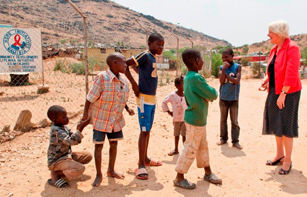
UNAIDS Deputy Executive Director, Management and Governance, Jan Beagle chats with a group of children during her recent visit to Namibia.
Credit: UNAIDS/T.Figuera
In August 2012, PharmAccess began expanding its operations into the rural and remote areas of Khomas and Omaheke regions with two additional mobile clinics. “PharmAccess Namibia is very proud to provide primary health care services to the people who need it most in Windhoek’s poorest informal settlements,” said Ingrid De Beer, Managing Director of Pharm Access in Namibia. “Our partnership with the Ministry of Health and Social Services, supported by Mister Sister Partners and the City of Windhoek, has made this possible. In the coming months, we look forward to collecting the evidence required to inform local policies on primary health service provision in the informal settlements of greater Windhoek,” she added.
In a recent visit to Namibia, UNAIDS Deputy Executive Director, Management and Governance, Jan Beagle, along with representatives of partner organisations involved in the project, commended the City of Windhoek and the Ministry of Health and Social Services for its leadership and commitment to strengthening the city's response to HIV.
Ms Beagle highlighted the excellent partnership between the community, civil society and government to meet the health needs of vulnerable populations in informal settlements around Windhoek and emphasized that “such innovative initiatives should be scaled up and replicated across the country.”

